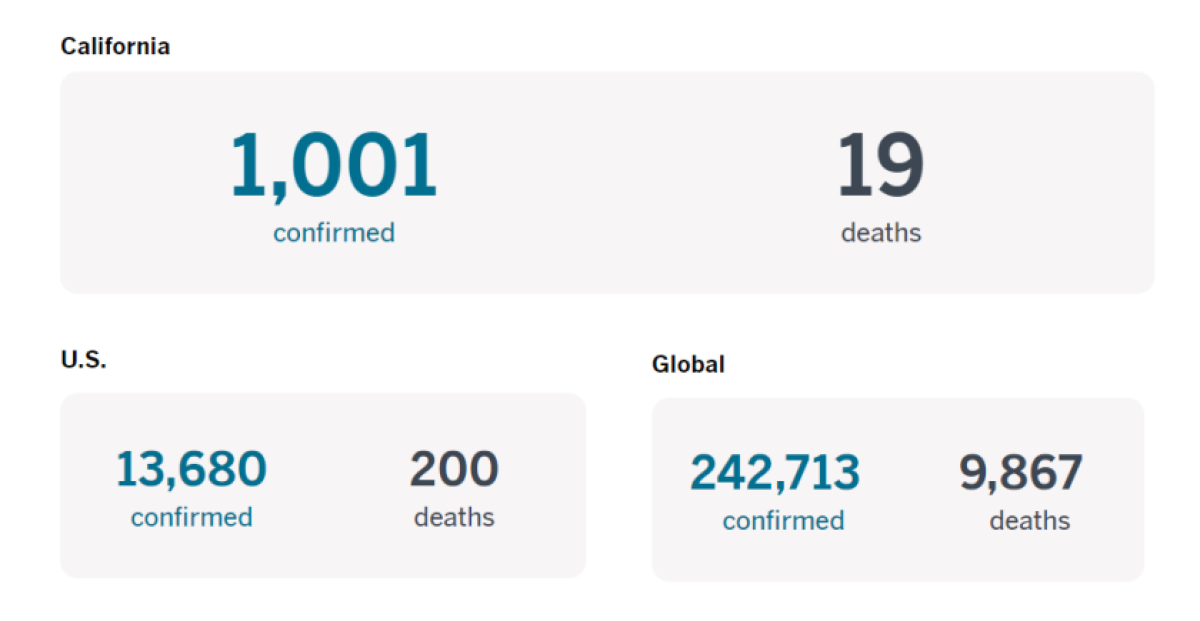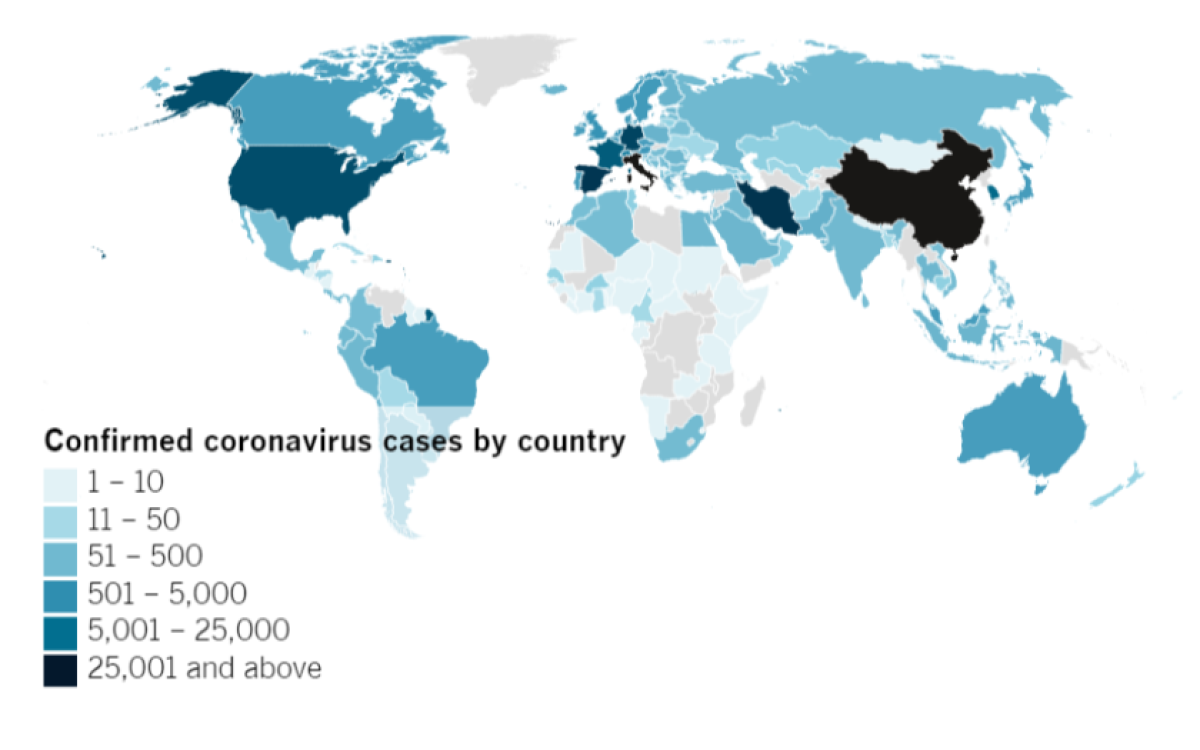Coronavirus Today: California cracks down
- Share via
Good evening. I’m Diya Chacko, and it’s Thursday, March 19. Here’s what’s happening with the coronavirus outbreak in California and beyond.
Gov. Gavin Newsom has ordered all Californians to stay at home, marking the first mandatory restrictions placed on all 40 million residents. He also asked Congress for $1 billion to support the state’s medical response to the coronavirus, saying he expects more than half of all Californians — roughly 25.5 million — will be infected over an eight-week period.
Earlier, Los Angeles County and city officials announced new orders that severely restrict public movement. The county order requires all indoor malls, shopping centers, playgrounds and nonessential retail businesses to close and prohibits gatherings in enclosed spaces of more than 10 people.
The city order, which you can read here, is much more restrictive. It requires all non-essential businesses to close, letting companies operate only though work-at-home arrangements, and bans all public gatherings of any size outside homes. Mayor Eric Garcetti said people should leave home only for essential activities, such as getting food, caring for relatives, getting necessary healthcare or going for walks.
Although the coronavirus has largely spared children, in China it has claimed the lives of a 10-month-old and a 14-year-old, at least. Although there were no details about the young teen’s case, the infant had a serious health condition. In California, a 34-year-old man who tested positive for COVID-19 after visiting Disney World and traveling through Los Angeles International Airport died Thursday at a hospital, according to medical and government sources.
The toll of the pandemic has caused a worldwide shift to how we grieve. In Iran, the soaring number of deaths has forced the abandonment of Islamic burial rituals. Some graves have the names of the deceased written on paper, others cardboard — a testament to the suddenness of the outbreak. Across the U.S., funeral directors said the rapid spread of the disease and shutdowns of public gatherings had upended their work and left families at a loss. The Centers for Disease Control and Prevention now recommends live-streaming funerals and limiting in-person attendance to immediate relatives.
The pandemic has also raised the specter of joblessness on a scale not seen since the onset of the Great Depression. The number of people filing new unemployment claims spiked last week to the highest level in 2½ years. In California, the number of filings has doubled since Tuesday, Newsom said.
Science reporter Deborah Netburn spoke to mental health experts about how we can adjust to a heightened state of anxiety when we don’t know how long it will continue. Researchers at Imperial College London have said we may need to continue social distancing behaviors until a vaccine becomes available, possibly 12 to 18 months down the road.
“It is very disorienting,” said Alison Holman, a health psychologist at UC Irvine. “It’s like reality isn’t reality right now.”
She says it’s more important than ever to stay connected with family and friends, even if it’s at a distance. If you’ve got a webcam and an internet connection, you can still host dinner parties, happy hours, game nights, karaoke sessions and more. Skype is free to download, works on phones, tablets and computers with webcams, and allows up to 10 people to join a group video call.
By the numbers
Cases as of 7:30 p.m. PDT Thursday:

Track the latest numbers and how they break down by county and by state with our graphics.
Where is the coronavirus spreading?

Your support helps us deliver the news that matters most.
Across California
California colleges and universities are grappling with whether to let students stay in campus housing or send them away. On Wednesday, hundreds of students were forced to leave Stanford University to comply with the Santa Clara County order banning gatherings of 50 or more. But as they evacuate, some students may lack access to shelter, food, Wi-Fi or a safe place to call home.
As thousands of international travelers pour into LAX, many have complained about haphazard health screenings, being required to stand or sit near others who have returned from countries with known outbreaks or not being screened at all. Public health experts say the screenings offer a false sense of security and are largely futile at this point.
As it turns out, toilet paper and hand sanitizer aren’t the only things Californians are stockpiling. Sales of weed and cannabis products have also skyrocketed, The Times found in an informal survey of dispensaries and delivery services.
Traffic conditions have been so light in Southern California, speeding during rush hour has become possible. Over the weekend, two drivers died in high-speed collisions on the 5 and 15 freeways. “With no traffic, people are pushing the envelope a little more,” one California Highway Patrol officer said.
How to stay safe
— Wash your hands for at least 20 seconds! Here’s a super-fun how-to video.
— Stop touching your face, and keep your phone clean.
— Watch for these symptoms of possible infection: fever, cough, shortness of breath.
— If you’re worried you might be infected, call your doctor or urgent care clinic.
How to stay sane
— Wondering whether you should self-quarantine? Here’s our guide.
— Here are all the ways to stay virtually connected with your friends.
— Need groceries? Here’s how to stock up for a self-quarantine. You can also watch our video guide on YouTube.
— Visit our free games and puzzles page for daily crosswords, card games, arcade games and more.
— The restaurant industry has been devastated. If you’re having a tough time, here are some free resources that may help.
Around the nation and the world
The Trump administration issued its toughest restriction on travel, urging Americans to avoid all international travel and warning U.S. citizens currently overseas to come home or prepare to remain where they are indefinitely. Trump said in a briefing he was consulting with the State Department on how to execute the new policy.
More than a dozen European countries, together with the European Union as a whole, have imposed travel restrictions and border checks, acting like medieval city-states shutting their gates in the face of encroaching foes rather than a united force. Some wonder whether European countries will emerge more insular, more tribal, more narrowly self-interested. “In a divided, leaderless world … we are all suffering from a tendency to go it alone,” former British Prime Minister Gordon Brown said.
More than 2,200 college students and recent graduates who enrolled in Disney’s internship programs at the Anaheim and Florida parks were informed Saturday that the program had ended and told they had until today to move out of apartments arranged by the company. Interns who traveled from as far as Chile and Australia were left scrambling to get airline tickets home. “They didn’t give us any resources or time to get resources,” one said.
Environment experts are predicting the pandemic will cause global emissions to drop for the first time since 2009 as millions go under lockdown or quarantine. However, the slide in emissions will be temporary, scientists say, and they’re worried the pandemic will undermine resolve to cut emissions in the long term. “I’m concerned about a sustained downturn in the economy and the narrative that we no longer have the luxury of addressing emissions,” one environmental scientist said.
Your questions answered
Today’s reader question comes from D. Aziz, who wants to know: Is it true that use of ibuprofen can worsen the symptoms of COVID-19? Science reporter Melissa Healy looked into it:
The over-the-counter pain reliever ibuprofen is not linked to a higher risk of COVID-19 infection. Nor has it been linked directly to complications in those infected.
The idea that it has any impact stems from a widely circulated tweet by France’s health minister, leaving U.S. doctors, public health officials and communications experts shaking their heads in dismay.
“Currently, there is no evidence that ibuprofen increases the risk of serious complications or of acquiring the virus that causes COVID-19,” according to the National Institute for Allergy and Infectious Diseases.
When treating pain or a fever, you may choose ibuprofen (such as Advil or Motrin) or acetaminophen (Tylenol) without needing to worry that your decision has any bearing on the disease.
Got a question? Our reporters covering the coronavirus outbreak want to hear from you. Email us your questions, and we’ll do our best to answer them. You can find answers to other common questions in our morning and midday roundup.
For the most up-to-date coronavirus coverage from The Times, visit our live updates page, visit our Health section and follow us on Twitter and on Instagram.




